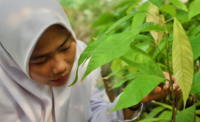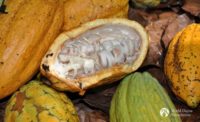Swiss agrifood testing company SwissDeCode, in collaboration with Mars Wrigley, has created an on-site test that is designed to detect Cocoa Swollen Shoot Disease (CSSD) in asymptomatic trees in less than 60 minutes.
Cocoa Swollen Shoot Disease is caused by plant viruses and transmitted by mealybugs from infected to healthy cocoa trees. The region of West Africa is particularly affected, especially Ghana and Ivory Coast, where over 780,000 hectares of cocoa trees are believed to be infected.
Cocoa trees affected by CSSD can be asymptomatic for up to two years, but then they start to show symptoms such as red leaf veins or swollen stems and roots, and typically die within three to four years of symptom development. Sick trees cannot be cured, and the disease can only be managed by preventing further spread to healthy trees by planting barrier crops or cutting out infected trees entirely.
CSSD has been an acute problem for the cocoa and chocolate industry for decades, as it can reduce cocoa yield by up to 70 percent. Until now, no efficient in-field methods to quickly detect the presence of the virus in asymptomatic plants had been found.
"We have been looking for reliable preventive solutions against CSSD since the 1940s, as each year cocoa farms are being increasingly affected by this virus,” said Jean-Philippe Marelli, senior director integrated pest management, Mars Wrigley. “Joining forces with SwissDeCode, we have finally found a rapid and reliable on-site diagnostic.”
Built on SwissDeCode's DNAFoil proprietary technology, and incorporating underlying research from Mars Wrigley, the new solution is an easy-to-perform testing kit that would enable field personnel to quickly test cocoa trees, using their leaves as samples. The test would allow farmers to detect infected trees before they show symptoms and to take immediate action to prevent the spread of the virus to healthy trees, thus helping to safeguard their current and future income.
The rapid test will benefit not only cocoa farms, but also cocoa tree nurseries, as it provides regular tree health monitoring and allows nurseries to release planting materials only when they are substantially free of the virus. Finally, replanting infected areas and regenerating old farms can be conducted with greater peace of mind, helping farmers increase both yields and income while preventing deforestation.
"Seeing that the result of our work helps to solve an issue that is impacting 14 million families makes us immensely proud,” said Brij Sahi, co-founder and CEO of SwissDeCode. “We are also making cocoa farming more sustainable, by preventing large-scale deforestation caused by recurring infections."
The successful collaboration with Mars Wrigley has allowed SwissDeCode to understand the specific issues and requirements of end users, from cocoa farmers to trading organizations. Once field validations have been successfully completed, the kit will be ready for large-scale use.






